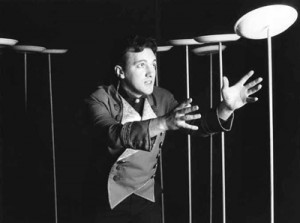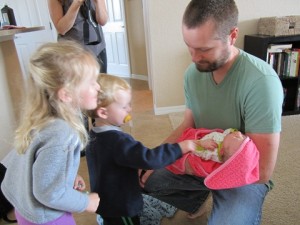My grandson Micah was recently gifted with something I’d never seen before: a balancing bike. It resembles a small two-wheeler but has no pedals and relies on push-power to move.
Although Micah is only two, he took to it immediately and has learned to sail down the length of his driveway without taking a tumble. He shoves off, then lifts his feet, and whoosh, down he goes, managing the tricky art of balancing. At some point he’ll want a traditional bike with pedal-power, but for now he and his wheels are inseparable.
Parents find themselves coaching their young children to learn several other balance-related maneuvers too, the first of which is learning to sit up at about 6 months. After that it’s walking, pumping a swing, rollerblading, ice skating, and others, all needing balancing expertise.
Certain kids take to balancing naturally (like Micah) while others need prolonged assistance and encouragement. After children master the physical art of balancing (say, their pre-teen years), they’re ready for the much harder task of balancing their lives. For some, even that comes easily, but the rest of us struggle, wobbling or even crashing completely once in a while.
And that’s where God comes in.
Children don’t need him to hold the seat of a two-wheeler or run alongside, because he’s given that assignment to parents. His balance-assistance is for grown-ups, since we’re the ones so often doing it poorly by ourselves.
Years ago The Tonight Show’s host, Johnny Carson, invited a plate-spinning comedian to perform one of those chaotic demonstrations we all love, but this performer was absolutely the best. He kept a dozen plates spinning atop wiggly sticks while balancing three more on his forehead, nose, and chin.
Surely he’d had a triple-espresso before coming on stage. His body was a blur as he leapt back and forth along the sticks, rescuing some just seconds before they threatened to crash to the floor. He was a balancing aficionado.
Of course this isn’t what God means when he asks us to bring balance to our lives. But plate-spinning mania is often the way we feel day-to-day while trying to meet our varied commitments. So what do we do?
We follow Micah’s example, tackling one balancing act at a time. If he’d started with a balancing bike, a pedal bike, and a mountain bike all at once, he’d have been in for some nasty road rash. The same goes for spinning plates. Few is preferable to frenetic, and with the first broken plate, back-pedaling is our only solution.
All of us have limits on what we can accomplish, limited time, energy, money, motivation, skills. But if we let God hand us exactly what he wants us to balance, he’ll never let us tip out of balance. After that, if we add any “plates” against his advice, it won’t be long before we’ll need a broom, a dust pan, and a revised balancing-plan from the Lord.
“Letting the Spirit control your mind leads to life and peace.” (Romans 8:6)







